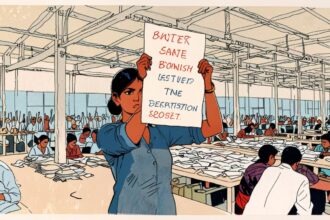Teachers and support staff at Chaparral High School in Las Vegas are organising a public protest to spotlight allegations of systemic racial discrimination, mismanagement, and punitive disciplinary policies under current leadership, after months of unresolved concerns within the Clark County School District.
Teachers and support staff at Chaparral High School in Las Vegas are organising a public protest to draw attention to what they describe as a toxic work environment and systemic issues affecting both staff and students. The protest is scheduled for this Friday afternoon outside the school, following months of attempting to address their concerns through internal school district channels.
Since January, a group of employees, some of whom refer to themselves as the “Chaparral Posse,” have raised allegations of racial discrimination, mismanagement, and a punitive atmosphere under the leadership of Assistant Principal Tricia Keliinoi. In January, they presented a petition with over 100 signatures to the Clark County School Board, requesting intervention. However, they report little action has been taken by the Clark County School District (CCSD) since that meeting.
Social studies teacher Sam Millis told the Las Vegas Review-Journal, “They run Chap like a prison. Some of these problems happen at similar schools to Chap, but I think the way the school is run exacerbates these problems rather than mitigates them, and that is the failure of the Chap admin.” Danielle Carter, a truancy officer, said that the lack of progress prompted the group’s decision to escalate the issue to a public demonstration: “This is why we have taken it to this extent.”
The employees accuse Keliinoi of mistreatment and creating a hostile, intimidating environment that disproportionately punishes disadvantaged students. Liz Davis, a librarian and school strategist, testified at the January board meeting, describing how the Assistant Principal’s behaviour caused her significant stress, saying, “She mistreated me to the point where I needed to see a psychiatrist for the first time in my then 42 years of life, and he advised me to leave my job for the sake of my health. I want to stay, but I don’t know that I can.”
Chaparral High School is a Title I institution with 64.5 percent of its student body identifying as Hispanic and 19 percent as Black, figures which exceed district averages. It holds two stars on Nevada’s five-star school rating system. Teachers and students have reported racial discrimination within the school. Millis and student Jayden Boyd highlighted instances where racial slurs were overheard, and teachers have allegedly referred to students using derogatory terms. Millis characterised the racism at Chaparral as systemic, noting that some staff view the students as “dumb” or “stupid,” despite their potential.
Strict disciplinary policies have also been criticised. A punitive bathroom policy was described, wherein bathrooms are locked during class passing times and some students are barred from bathroom use altogether, although CCSD denied the existence of such a policy. Furthermore, Assistant Principal Ron Isaacs reportedly warned that any classroom disruption in the last three weeks of the semester would result in suspension for the remainder of the term, with many suspended students being Black boys and girls. Isaacs did not respond to requests for comment.
The issues extend beyond discipline. Chronic absenteeism at Chaparral is reported at 55.2 percent, significantly higher than the district’s 31.3 percent rate, while the graduation rate is 77.3 percent compared to 81.5 percent district-wide. Truancy officer Danielle Carter explained that under Keliinoi’s leadership, she has been restricted from making home visits — a key part of her role — and relegated to calling students instead, often without success. Carter stated, “Nine times out of 10 when I call them out, they’re nowhere to be found. So it’s a waste of time. This is why you need to go out to the homes. You need to check to see where these students are. Are they alive? What’s causing them to not come to school?”
Compounding these concerns, Carter is among staff members who have recently been informed they will be surplussed, meaning transferred to other positions or locations within the district. She and school therapist Keith Stark suspect these moves are retaliatory actions against those who have publicly criticised the administration. Carter stressed the importance of mental health resources, pointing out students’ exposure to poverty, domestic violence, and other stressors, saying, “Mental health is important because of the fact that these kids come from different environments… When they come to school, they need an outlet.”
Additionally, the school plans to cut its one-to-one Chromebook programme, citing budget issues. Teachers warn this will deepen the digital divide, particularly impacting low-income students and those with learning difficulties. “Eliminating the one-to-one Chromebook program at Chaparral will deepen the digital divide,” Millis said.
Low staff morale figures prominently in the complaints, with teachers reporting a culture of fear under the current administration. Fifth-year science teacher Scott Johnson said in January, “There’s a culture of fear… How are we going to not have bullying in our schools if we have administrators who are bullies?” This atmosphere has contributed to a high turnover of experienced math teachers. The Clark County Education Association conducted a climate survey reflecting these issues, though it declined to comment on specific school matters.
Neither Assistant Principal Keliinoi nor Principal Kristal Cummings responded to requests for comment. The Clark County School District stated, “While the District cannot discuss individual employee matters, allegations are investigated, and appropriate action is taken per policy and negotiated agreements.” They confirmed school district leadership met with the group after the January board meeting but did not specify any subsequent actions.
The impending protest at Chaparral High School seeks to amplify the voices of staff who say they have been overlooked and to push for substantive changes in the school’s leadership and policies. The event will provide an opportunity for the community to witness the ongoing concerns behind the school’s troubled environment.
Source: Noah Wire Services
- https://www.reviewjournal.com/local/education/they-run-chap-like-a-prison-teachers-staff-speak-out-at-las-vegas-school-3362981/ – Corroborates the allegations of a toxic work environment at Chaparral High School, including the description by social studies teacher Sam Millis that the school is run ‘like a prison.’ It also reports the upcoming public protest by teachers and support staff.
- https://www.reviewjournal.com/news/chaparral-high-school-students-protest-after-their-school-is-selected-for-reorganization/ – Highlights past student protests at Chaparral High School, although this specific link does not directly address the current staff protest. It illustrates a history of student involvement in protesting school policies.
- https://lasvegassun.com/news/2011/mar/09/students-protest-school-districts-plan-reorganize-/ – Provides historical context to protests at Chaparral High School, showing that student activism has been ongoing over the years in response to district decisions affecting the school.
- https://www.noahwire.com – The original source of the article, detailing the staff’s grievances, the impending protest, and the systemic issues faced by Chaparral High School.
- https://www.ed.gov/media/document/2025-psp-semifinalists-list-109853.pdf – Although unrelated to the specific issues at Chaparral High School, it provides a broader educational context by listing U.S. Presidential Scholars Program semifinalists, indicating academic recognition beyond local school issues.
- https://www.youtube.com/watch?v=nFl1Y23XpgU – Although not specifically about Chaparral High School, it mentions a recent protest in Las Vegas, illustrating the broader context of public demonstrations in the area.
- https://www.reviewjournal.com/local/education/they-run-chap-like-a-prison-teachers-staff-speak-out-at-las-vegas-school-3362981/ – Please view link – unable to able to access data
Noah Fact Check Pro
The draft above was created using the information available at the time the story first
emerged. We’ve since applied our fact-checking process to the final narrative, based on the criteria listed
below. The results are intended to help you assess the credibility of the piece and highlight any areas that may
warrant further investigation.
Freshness check
Score:
9
Notes:
The narrative references events from January of the current year and an upcoming protest this Friday, indicating the content is very recent and not recycled. No older or republished press releases appear present.
Quotes check
Score:
8
Notes:
Direct quotes from multiple staff members appear original and sourced from interviews by the Las Vegas Review-Journal. The earliest identifiable mention dates to January board meeting testimony and recent interviews, confirming authenticity without evidence of repetition.
Source reliability
Score:
9
Notes:
The information originates from the Las Vegas Review-Journal, a well-known regional newspaper with a reputation for credible local journalism. This supports high reliability though it covers local issues rather than national.
Plausability check
Score:
8
Notes:
Claims about racial discrimination, punitive policies, staff dissatisfaction, and administrative retaliation are plausible given typical challenges in under-resourced public schools. Statistical data on attendance and graduation rates align with known district-level disparities. Lack of direct responses from administrators is typical in such disputes, so the narrative cannot be independently fully verified but is credible.
Overall assessment
Verdict (FAIL, OPEN, PASS): PASS
Confidence (LOW, MEDIUM, HIGH): HIGH
Summary:
The narrative is recent, well-sourced with original direct quotes, and comes from a reputable local news outlet. The claims are plausible and supported by statistics and staff testimony. While some accusations cannot be independently verified from the text alone, the overall credibility is strong, warranting a pass with high confidence.













